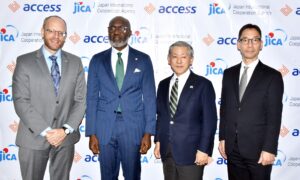Access Bank PLC (Access Bank), Nigeria’s largest commercial bank, has taken a significant stride towards environmental sustainability with the signing of a historic loan agreement with the Japan International Cooperation Agency (JICA). Valued at US$ 75 million, the agreement is JICA’s first private sector investment finance in the banking sector in the Sub-Saharan African region. Citi acted as the sole coordinator and agent.
The ceremony – which held on Monday, February 5, 2024 – underscores a commitment of Access Bank, JICA and Citi to support climate change measures in Nigeria. The use of proceeds of the loan are expected to be used to finance a wide range of sub-projects such as renewable-energy projects, energy-saving projects and agriculture-related projects that contribute to climate change measures.
Roosevelt Ogbonna, Managing Director/CEO of Access Bank PLC, commented on the significance of this partnership, stating:
“At Access Bank, we recognise the urgent need for sustainable solutions to combat climate change. This landmark agreement with JICA reaffirms our commitment to leveraging financial resources for impactful initiatives that promote environmental resilience and contribute to Nigeria’s climate action agenda. By investing in renewable-energy, energy-saving, and agriculture-related projects, we aim to create a positive ripple effect, not only mitigating the effects of climate change but also fostering economic growth and improving livelihoods within our communities. Indeed, this partnership represents a shared commitment to a greener, more sustainable future for Nigeria and beyond.”
Jin Wakabayashi, Deputy Director General, Private Sector Partnership and Finance Department at JICA commented on the importance of implementing this project:
As this project is positioned as the first bank loan facility by JICA’s private sector investment finance in the country, this significantly marks a new milestone in the long history of JICA’s cooperation with Nigeria and has a very special meaning indeed. In addition, we are delighted to have an opportunity of working with such a reputable and quality partner, Access Bank, which has a sophisticated business platform and established track record of climate finance. Under the partnership with Access Bank, JICA’s Facility is expected to be used for projects which contribute to climate change measures in Nigeria, and we expect that this collaboration will be further deepened for the years to come.
Richard Hodder, Global Head of Export Agency Finance (EAF) at Citi commented on the impact of this international partnership:
“At Citi, we are committed to bringing solutions to our clients which facilitate investment linked to the energy transition, to energy security and to the key drivers of economic growth. Citi is proud to partner as the sole coordinator and agent in facilitating JICA’s first transaction in Sub-Saharan Africa under the Private Sector Investment and Finance scheme. Following on from the Citi-arranged DFC (U.S. International Development Finance Corporation) facility to Access Bank in 2022, this partnership is a meaningful roadmap towards TICAD 9 (Tokyo International Conference on Africa Development) to be held in Tokyo in 2025.”
Nigeria, a signatory to the Paris Agreement, has set ambitious targets to reduce greenhouse gas emissions, requiring substantial investments in climate change mitigation and adaptation measures.
Furthermore, the implementation of the deal aligns with Nigeria’s efforts to mobilise private sector funds for climate action, in line with Sustainable Development Goals 2 (Zero hunger), 7 (Affordable and clean energy), 13 (Climate action), and 17 (Partnerships for the goals). Moreover, it resonates with Japanese Prime Minister Kishida Fumio’s vision for a more climate-resilient and sustainable society, as announced at the Partnership for Global Infrastructure and Investment, a side event of the G7 Summit in Hiroshima in May 2023.
Through strategic collaborations and innovative financing mechanisms, Access Bank and JICA together with Citi are pioneering efforts to address climate change challenges, setting a precedent for sustainable development in the region.
About Access Bank PLC
Access Bank, a wholly owned subsidiary of Access Holdings Plc, is a leading full-service commercial bank operating through a network of more than 700 branches and service outlets spanning 3 continents, 20 countries and over 70 million customers. The Bank employs over 28,000 thousand people in its operations in Africa and Europe, with representative offices in China, Lebanon, India, and the UAE.
Access Bank’s parent company, Access Holdings Plc, has been listed on the Nigerian Stock Exchange since 1998. The Bank is a diversified financial institution which combines a strong retail customer franchise and digital platform with deep corporate banking expertise, proven risk management and capital management capabilities. The Bank services its various markets through four business segments: Corporate and Investment Banking; Commercial Banking; Business Banking, and Personal & Private Banking. The Bank has enjoyed what is arguably Africa’s most successful banking growth trajectory in the last 18 years, becoming one of the continent’s largest retail banks.
As part of its continued growth strategy, Access Bank is focused on mainstreaming sustainable business practices into its operations. The Bank strives to deliver sustainable economic growth that is profitable, environmentally responsible, and socially relevant, helping customers to access more and achieve their dreams.
About Japan International Cooperation Agency (JICA)
Established as an Incorporated Administrative Agency under the Act of the Incorporated Administrative Agency – Japan International Cooperation Agency (Act No. 136, 2002), JICA aims to contribute to the promotion of international cooperation as well as the sound development of Japanese and global economy by supporting the socioeconomic development, recovery or economic stability of developing regions. JICA is advancing its activities around the pillars of a field-oriented approach, human security, and enhanced effectiveness, efficiency, and speed.
About Citi
Citi is a preeminent banking partner for institutions with cross-border needs, a global leader in wealth management and a valued personal bank in its home market of the United States. Citi does business in nearly 160 countries and jurisdictions, providing corporations, governments, investors, institutions and individuals with a broad range of financial products and services.






 BIG STORY1 day ago
BIG STORY1 day ago
 BIG STORY5 days ago
BIG STORY5 days ago
 BIG STORY3 days ago
BIG STORY3 days ago
 BIG STORY4 days ago
BIG STORY4 days ago
 BIG STORY3 days ago
BIG STORY3 days ago
 BIG STORY2 days ago
BIG STORY2 days ago
 BIG STORY2 days ago
BIG STORY2 days ago
 BIG STORY21 hours ago
BIG STORY21 hours ago





























